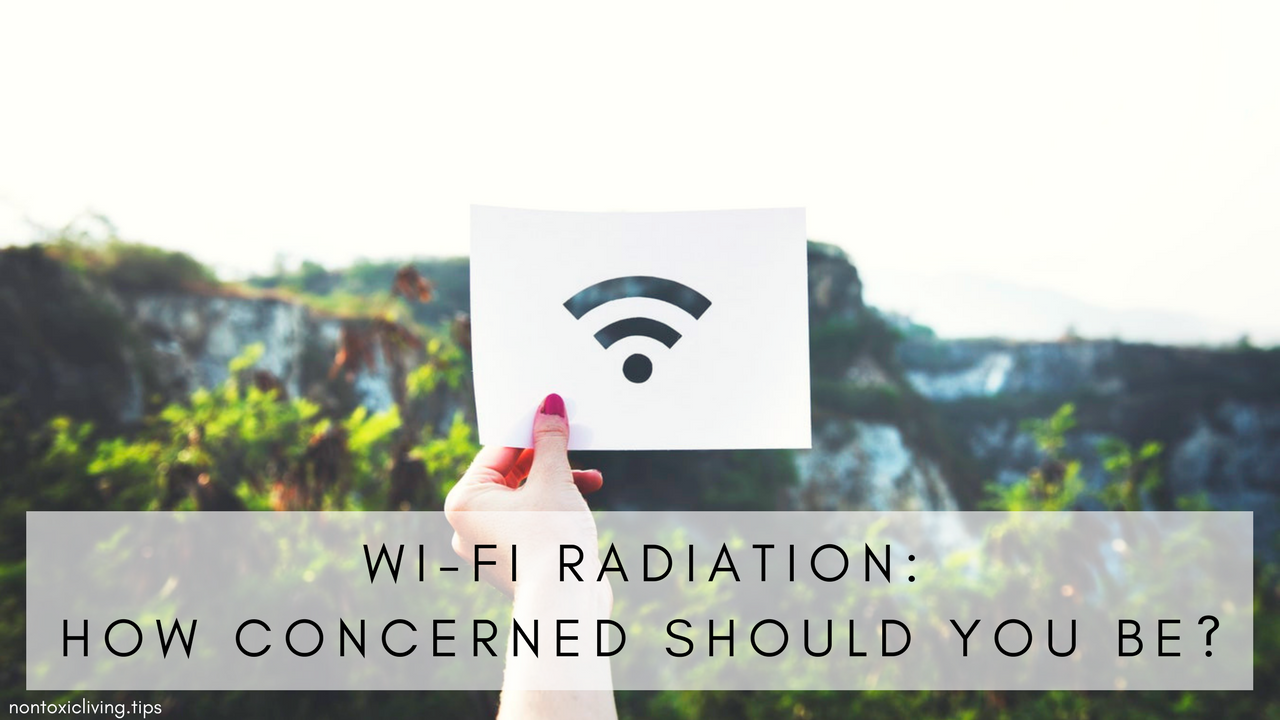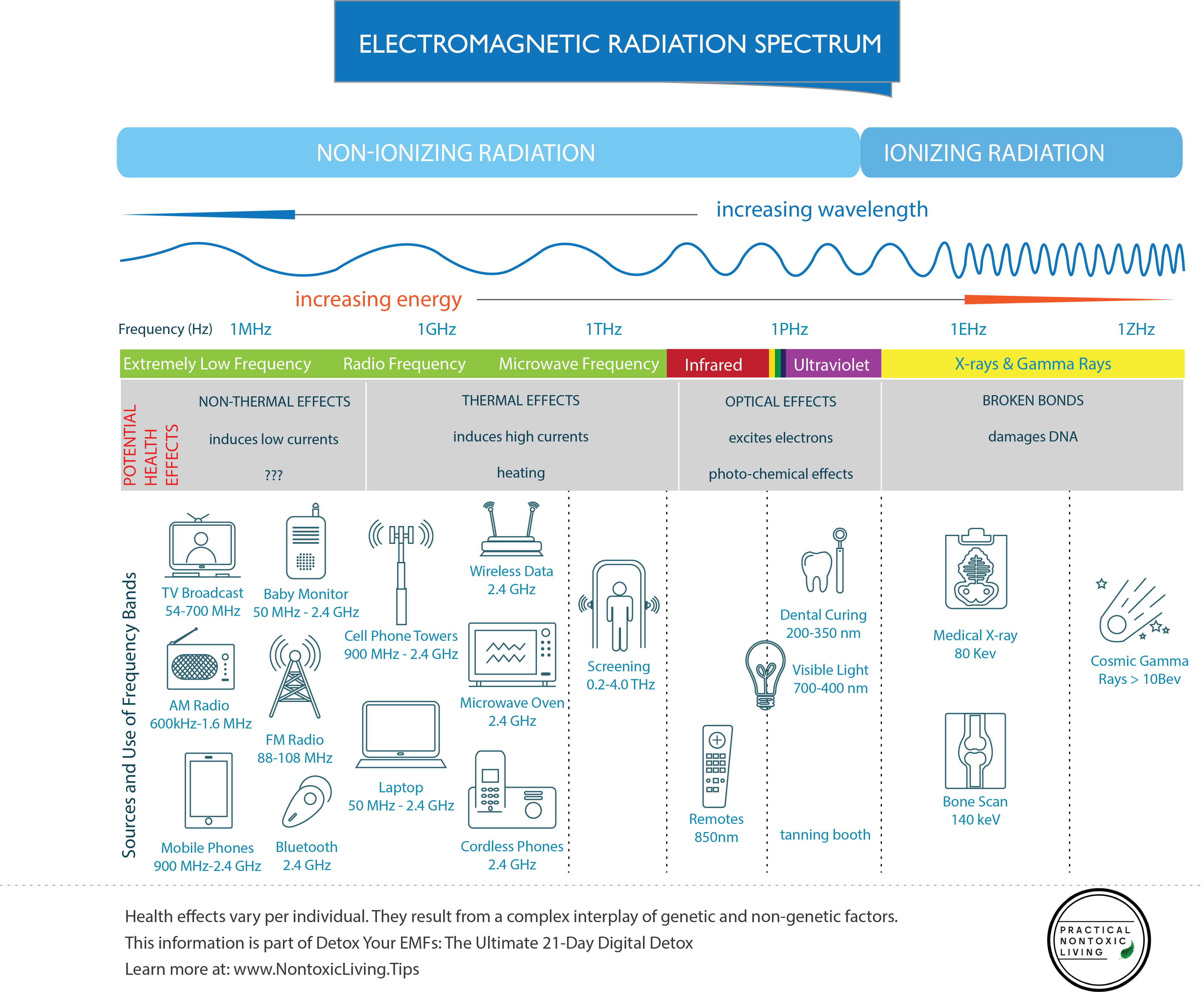
WiFi Radiation: How Concerned Should You Be?
Dec 29, 2017by editorial team and Sophia Ruan Gushée
Why should you be concerned about the WiFi radiation in your home? It seems harmless. And you haven’t noticed any harmful effects. But does that mean there haven't been any?
In this article, we will provide essential information about WiFi radiation, including the experts’ views on potential health risks. We will also provide 6 tips to protect yourself from your wireless devices.
What is WiFi Radiation?
Along the electromagnetic radiation spectrum, WiFi radiation is a category of energy that is shorter than radio waves and longer than microwaves (as you can estimate in the image below; specifically, WiFi operates in the 2 to 5 GHz range). Some people use the terms WiFi, radio waves, or cellphone electromagnetic radiation interchangeably. These waves are invisible, about 3 to 5 inches from crest to crest, and they are released through the air and can affect the body.
All of our technology devices—not just our WiFi routers—are constantly contributing to electromagnetic fields (EMFs). Wireless devices that emit WiFi radiation include our cell phones, bluetooth speakers, and other wireless devices.
What We Know So Far
John Moulder, professor emeritus of radiation oncology at the Medical College of Wisconsin, recognizes the quantity and overall presence of radiation as a new phenomenon. However, radiation from our everyday devices has been a topic of scientific study for decades.
While this radiation has many sources, one common form that deserves more attention are WiFi routers.
WiFi radiation—including from WiFi routers—is referred to as 'low frequency EMFs' and is the same type emitted by cell phones and laptops. Moulder states that, “While several studies report biological effects due to WiFi-type exposures, technical limitations prevent drawing conclusions from them about possible health risks of the technology.”
Ok, but what did we discover?
What we do know for sure is that electromagnetic radiation, at high frequencies, promotes tumor growth and cancer. At lower frequencies (like from our household products), there remains a lot of debate on how much to worry. However, the developing science is underscoring precautionary measures, and increasingly, more experts are recommending that we avoid unnecessary exposures.
For more information about WiFi and its health effects: WiFi EMF & How Do You Protect Yourself?
According to Joel Moskowitz, Director of the Center for Family and Community Health, certain animal studies have suggested that low level radiowave exposures have significant negative health effects, such as neurodevelopmental issues, cancer, and reproductive harm in both men and women.
Dr. Hugh Taylor of Yale University also found neurodevelopment harm from prenatal exposures to cell phone radiation in mice studies. Again, both cell phones and WiFi routers emit low frequency EMFs.
Listen to my podcast with Dr. Hugh Taylor about how toxic exposures may affect fertility and pregnancy outcome, or review the transcript.
WHO and IARC made their own statement by classifying mobile phones as a 2B ‘possible carcinogen’, which is in the same class as WiFi radiation.
One study conducted on rodents showed that higher levels of WiFi and cell phone exposures caused hormonal shifts and oxidative stress, which are known to promote cancer and brain diseases.
While we still need decades more research to understand the influence of WiFi radiation, individuals around the world are reporting debilitating or chronic symptoms. Popular terms include digital dementia, and WiFi allergies! People have also been granted compensation for disabilities due to WiFi exposures, including in France, Australia, and Sweden.
Limitations in animal studies
While we learn a lot from animal studies and a lot can be applied to humans, it's not exactly the same.
One noticeable difference is that in the experiments, the rodents were exposed to greater levels of radiation than a human typically would be.
Another is that due to the variety of lifestyles from person to person, each individual’s level of exposure over a period of time will vary greatly.
Furthermore, we aren’t yet sure as to which biological factors, exactly, contribute to the negative effects on the body. Some of those factors would include genetics, pre-existing medical conditions, and immune issues. These are all circumstances unique to each person, and they cannot be taken into account when testing on rodents.
Taking it beyond the scope of a typical adult, it must also be noted that a child’s brain is far more fragile than an adult’s, and operates under still a different set of rules and conditions. These particular conditions are also something that cannot be observed through controlled experiments.
6 Tips to Protect Yourself
Moscowitz recommends that we minimize our WiFi radiation exposures. The best ways to do this are to:
- Keep your wireless devices away from any human body.
- Turn off your wireless networks when they are not in use.
- Keep cell phones and tablets away from small children.
- Use hardwired internet connections for computers instead of using Wi-Fi.
- Ensure that pregnant women always keep wireless devices away from their abdomen.
- Avoid cordless phones altogether.
Learn about other ways to reduce wireless devices effects here.
Your Next Step
While it will take decades to understand WiFi radiation better, we have data to know that precautionary measures would be wise.
In this article, you learned about experts’ opinions on WiFi radiation and your health, as well as 6 tips to help you reduce your exposures to the harmful effects of radiation.
If you want to reduce your exposure to similar types of radiation from other household products in your home, then consider our Detox Your EMFs: The Ultimate 21-Day Digital Detox. You will receive practical checklists on what to do over 21 days, as well as support and additional experiences to broaden your tools for optimizing your energy.





